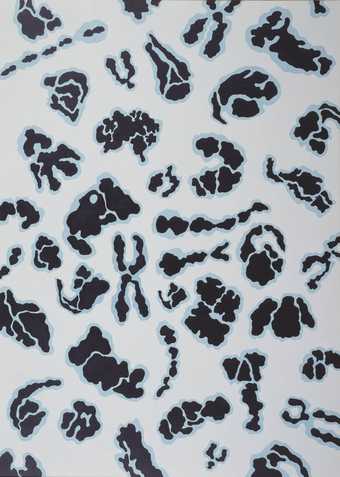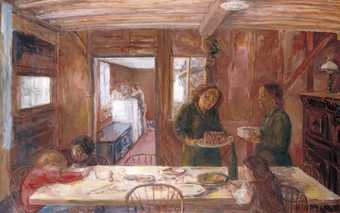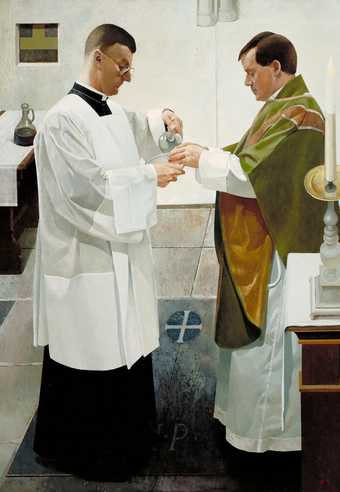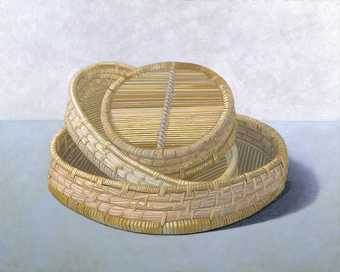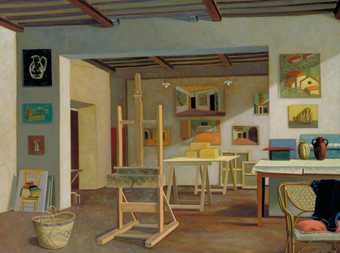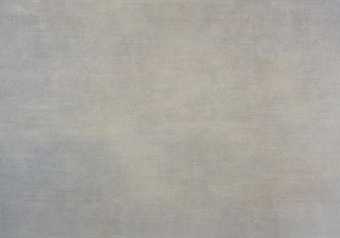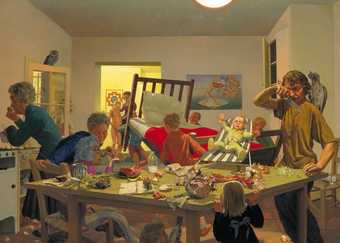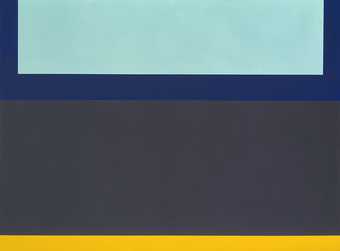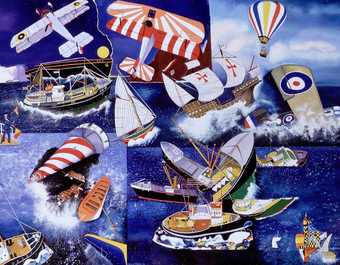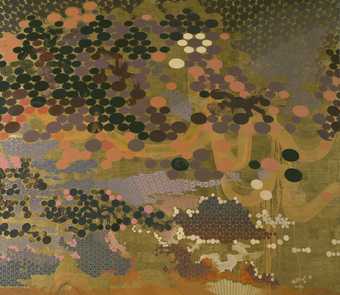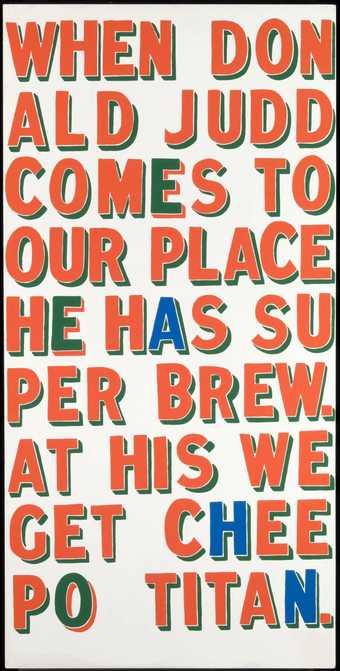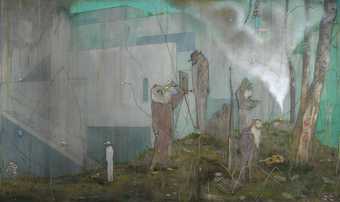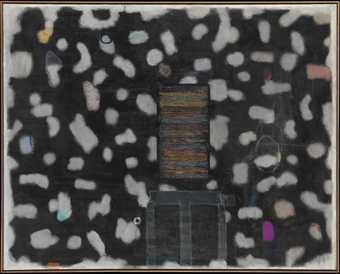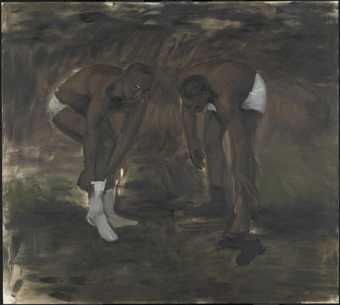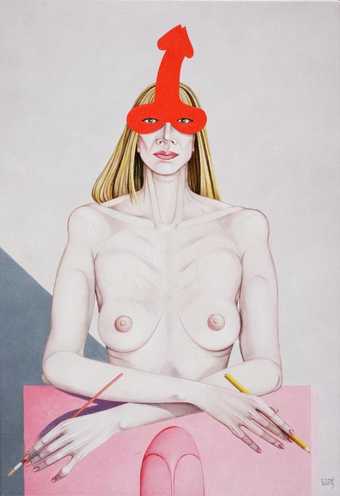
Not on display
- Artist
- Simon Ling born 1968
- Medium
- Oil paint on canvas
- Dimensions
- Support: 1220 × 917 mm
- Collection
- Tate
- Acquisition
- Purchased 2011
- Reference
- T13580
Summary
Untitled 2008 is painted in oil on canvas and depicts an orange, shallow, rectangular moulded box mounted to a wall. Suspended from the interior of the box at staggered intervals are five string bags containing oranges. Loose oranges are also stacked in the lower part of the box and a gravity-defying column of fruit creeps up the left hand edge. The corners of the box have shallow circular and triangular indentations, suggesting that it has been moulded out of plastic. Three silver knobs on its lower edge suggest that it has, or once had, an electronic function, like a screen.
This plastic box has featured in Ling’s paintings since 2001, originally forming a heap with other urban detritus and latterly, as here, as a framing device for arrangements of objects and materials. A children’s sandpit found by Ling on one of his many scavenging trips, the box appealed to the artist both for its textural qualities and formally ambiguous status. Whether constructing tableaux, such as this, to paint in the studio or finding patches of landscape outside, Ling does not actively seek out a subject as such but, rather, is drawn to the objects in front of him or his immediate surroundings. By focusing on objects and places that appear inconsequential or difficult to name or classify, Ling liberates his subject from representing anything other than itself. For Ling, ‘perception is an act of creativity’ (Simon Ling in conversation with Tate curator Lizzie Carey-Thomas, 26 April 2011), in which thought and action combine, recalling German painter Gerhard Richter’s (born 1932) comment that ‘painting has nothing to do with thinking because in painting thinking is painting’ (quoted in Hans Ulrich Obrist (ed.), The Daily Practice of Painting: Writings and Interviews 1962–1993, trans. by David Britt, London 1995, p.13).
Ling’s primary concern is his emotional relationship to the visual world, accessed and described through a process of intense scrutiny and physical interaction with his subject. He seeks to emphasise not just what an object looks like or its material qualities but the experience it engenders, to create an emotional equivalence for its material reality. In Untitled 2008, despite the monochromatic nature of the subject, the distinct qualities of the different objects are preserved and heightened. The three-dimensionality of the box is enhanced through the indentations at each of its corners and the shadows at its base, causing it to project outwards from the pale background. The oranges have each been meticulously modelled, emphasising the weight, density and sensation of the fruit in the string bags, so that they appear almost in relief and present an amplified, almost ‘cartoon-like version of reality’ (Simon Ling in conversation with Tate curator Lizzie Carey-Thomas, 26 April 2011).
Like other painters of his generation such as Tomma Abts, Gillian Carnegie and Glenn Brown, Ling’s work reflects and exploits a tension between the represented image and its material construction through paint. Ling paints both in the open air, where his subject is found in areas of nondescript urban or rural wasteland (see Untitled 2010, Tate T13581), and in the studio from constructed tableaux, as with Untitled 2008. Despite the diverse nature of his subject matter, his approach is a consistent one, an attempt to give form to an experience of the subject over an accurate likeness. He has commented that ‘it is a question of how you see something, not what it is’ (ibid.).
Further reading
Sally O’Reilly, Time Out, 5–12 December 2001, p.62.
Head-Wig: Portrait of an Exhibition, exhibition catalogue, Camden Arts Centre, London 2009.
Lizzie Carey-Thomas and Clarrie Wallis, Art Now: Beating the Bounds, exhibition leaflet, Tate Britain, London 2009.
Lizzie Carey-Thomas
May 2011
Does this text contain inaccurate information or language that you feel we should improve or change? We would like to hear from you.
Explore
- objects(23,571)
-
- food and drink(980)
-
- fruit, orange(28)
- vessels and containers(2,157)
-
- crate(27)
You might like
-
Tim Head Deep Freeze
1987 -
John Lessore Sunday
1985–9 -
Norman Blamey The Lavabo
1993 -
Stephen McKenna Three Baskets
1995 -
Stephen McKenna Large Studio at Castiglion
1993 -
Simon Callery Archive
1996 -
Jonathan Leaman A Jan Steen Kitchen
1995–6 -
Jean Spencer [no title]
1997 -
Malcolm Morley Mariner
1998 -
Toby Ziegler The Hedonistic Imperative (2nd version)
2006 -
Bob and Roberta Smith When Donald Judd Comes to our Place...
1997 -
Nigel Cooke New Accursed Art Club
2007 -
Prunella Clough Stack
1993 -
Lynette Yiadom-Boakye The Generosity
2010 -
Caroline Coon Self in Cock Mask
2003

